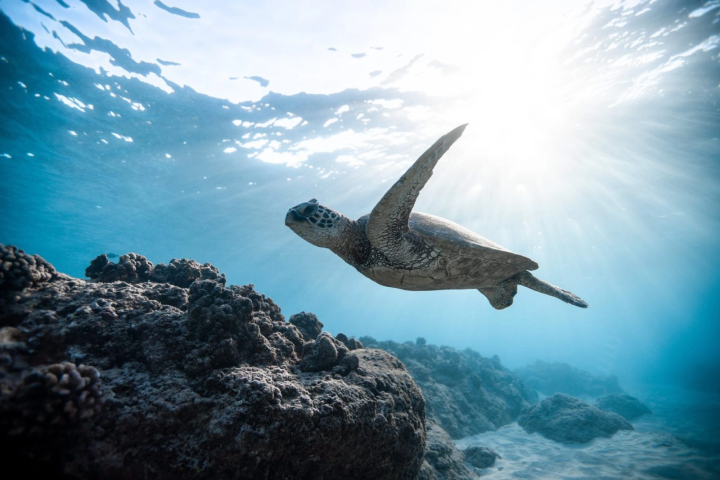ISS TODAY OP-ED
Sea turtle population in deep water as West Africa poaching and trafficking thrive unpunished

Sea turtles will remain a target unless viable alternative livelihoods are created for fisher communities.
Over a million sea turtles were illegally killed or trafficked globally between 1990 and 2020, researchers estimate. To put this in perspective, there are roughly only 6.5 million sea turtles left in the world.
West Africa contributes significantly to their exploitation. In just one incident in June 2021, customs officers in Burkina Faso seized 555 sea turtles smuggled from Bamako in Mali and Lomé in Togo. It is estimated that up to 50% of sea turtle eggs in Togo are trafficked by local fishers.
While pollution, accidental fishing and climate change contribute to sea turtles’ decline along Africa’s coast, poaching and trafficking are the major drivers. Shells seized alongside elephant ivory in Togo and Benin indicate that sea turtles may form part of a well-organised wildlife trafficking network in West Africa, specifically in Togo, Liberia, Côte d’Ivoire and Ghana.
The West African littoral is home to some of the world’s most important sea turtle nesting beaches, and five species along this coast risk extinction. The loggerhead, leatherback, hawksbill, green and olive ridley marine turtles are categorised between vulnerable and critically endangered on the International Union for Conservation of Nature’s Red List of Threatened Species.
Read more in Daily Maverick: The trials, tribulations and joys of turtle liberation
Sea turtles are an essential resource for coastal communities. For thousands of years, they have been hunted for their meat, eggs, shell, skin and internal organs. In Togo, sea turtles are valued for their flesh and shell. Sea turtle products are used to make jewellery, handicrafts, cough syrup and oil for traditional medicine in many West African countries. Some believe turtle by-products have aphrodisiac properties.
Their trafficking is driven by personal use and local consumption. A lack of economic alternatives for coastal communities and a decrease in the fish stocks they rely on for food and income mean that sea turtle poaching has become a viable income source. As a result, a well-organised illegal market for turtle meat controlled by local poachers is thriving.
Poachers target the turtles at sea and hunt them and their nests on beaches. They are then trafficked along trade routes throughout the region — including Ghana, Nigeria, Liberia, Benin and Cameroon — where they are sold to traders at local markets.
Poaching impacts entire ecosystem
Sea turtle poaching threatens biodiversity. These animals play a major role in the marine ecosystem by preserving healthy seagrass beds, limiting marine sponge growth and keeping jellyfish populations in check. This is crucial for maintaining healthy coral reefs, which sustain and protect various fish species.
West African countries are aware of the problem. All members of the Economic Community of West African States are signatories to the Convention on International Trade in Endangered Species of Wild Fauna and Flora. And although legislation exists to protect and preserve sea turtles in most West African jurisdictions, implementation is lacking.
Offenders caught poaching sea turtles receive only a warning, with no fine. Little is done to dissuade people from poaching, killing or selling sea turtles, or to tackle the illegal hunting and harvesting of their eggs.
Over the past 20 years, West African states have created marine protected areas such as the Bijol Islands in The Gambia and Ghana’s Keta Lagoon to protect sea turtles. However, authorities and local non-governmental organisations (NGOs) lack human and financial resources, and the technical means to monitor and protect these areas.
Patrols don’t have the staff or equipment to mark all nests, record their locations, or cover them with cages. International NGOs do this, which is neither financially sustainable nor politically appropriate in the long term.
In March 2022, African states organised the first African congress on sea turtles in Cotonou, Benin. Regional networks such as the West African Sea Turtle Conservation Network were created — a positive step towards better sea turtle management and a sign that governments intend to take the matter more seriously. Yet much more needs to be done.
West African states should partner with local NGOs to protect sea turtles from poaching and trafficking. This requires financial and technical resources, and an investment in public education. Information campaigns should remind local communities that hunting sea turtles will lead to their extinction and harm the entire marine ecosystem, threatening the incomes of fishers and their families. But sea turtles will remain a target unless other viable livelihood options are available.
Ecotourism lifeline
Côte d’Ivoire provides a good practice example, where Conservation des Espèces Marines (CEM) works with local NGOs and communities to develop ecotourism. This creates employment in the hotel and catering industries, and raises awareness among communities of sea turtles’ value.
CEM has helped provide services, such as installing solar-powered drinking-water supply systems, building local health centres and rebuilding primary schools. Working on these projects with inhabitants, many of whom were involved in sea turtle poaching or consumption, garners support for conservation. And with the help of local communities, Côte d’Ivoire created its first marine protected area for nesting turtles in Grand-Béréby.
Together with international and local NGOs – which play an invaluable role and should be supported – West Africa’s governments must drive the protection of sea turtles. Their potential extinction poses a significant threat to the region’s coastal ecosystems. DM
Abdelkader Abderrahmane, Enact Senior Researcher, West Africa, Institute for Security Studies (ISS).
Enact is funded by the European Union and implemented by the Institute for Security Studies in partnership with Interpol and the Global Initiative against Transnational Organized Crime.
First published by ISS Today.



















 Become an Insider
Become an Insider
Comments - Please login in order to comment.